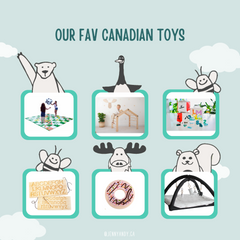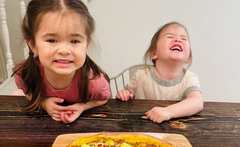
You might have noticed that your toddler's growth has slowed down since the first year of life. That’s because toddlers grow at a much slower rate than babies do. While it might seem as if little has changed on the outside, your toddler is making strides each day in language development, learning, balance, and coordination.
At 18 months, your toddler is now walking and talking, using basic words. At this age, children love to play and explore. They’ll start showing more independence, may play pretend, and point at objects they want. They also begin to understand what things in the house are used for, such as a cup or spoon.
This stage of your toddler’s life is a “doing stage”. Your toddler will spend much of their time exploring and discovering - learning about the world by trying to do things, testing, and experimenting.
Keep in Mind
Keep in mind that the actual age when a typically developing child reaches a milestone really can vary. Each child develops in their own unique way, so there's no need to worry unnecessarily if your child isn't hitting a milestone right away, especially if your child is hitting most milestones in other domains.
That being said, you are your child's best advocate. If there is an issue, it's always best to act early, so if you have any concerns about your child's development, please speak with your pediatrician.
Social and Emotional Milestones

Your child will develop a very specific image of his social world, friends, and acquaintances. Although he knows you’re close at hand, he is in the centre of his world. He knows other people exist, but he has little interest in them and, as far as he’s concerned, everyone else thinks the way he does.
His egocentric view makes it hard for him to play with others cooperatively, but he’ll play alongside of others (called parallel play) and compete for toys. He’ll enjoy observing and being around other children, especially if they are older. At this age your toddler may show possessiveness over toys he knows belong to him, so try reassuring him that the other children are only looking at his toy and that it’s OK to give other children a turn and it won’t be taken away from him.
Praise your toddler when he does show signs of empathy, such as taking care of toys or giving a caring gesture to others. All of these things help support social and emotional development.
Many babies at this age:
- Like to hand things to others as play
- May have temper tantrums
- Play simple pretend, such as feeding a doll
- Point to show others something interesting
- Explore alone but with parent close by
Language & Communication Milestones

By 18 months, your child will likely start using a few active verbs, such as “go” and “jump” as well as prepositions/location words like “up,” “down,” “in,” and “out.”
He’ll start to formulate his own version of a whole sentence by combining a single word with a gesture or grunt. He might point and say “ball” - his way of telling you he wants you to roll him the ball. He might even ask a question by inflecting and raising his voice at the end (“Up?”). Soon, he’ll start combining verbs or prepositions with nouns to make statements like “Daddy up” or “Drink milk,” and questions like “What’s that?”
Many babies at this age:
- Use common words and start to put words together
- Say and shakes head “yes” and “no”
- Points to show someone what he wants
- Points at familiar objects and people in pictures
- Understand 10 times more than they are able to put into words
- Understands “in” and “on”
Cognitive Milestones

Your child will start getting really good at hiding games, remembering where hidden objects are long after they leave her sight. Even if you forget about the cracker you put in your pocket, she might not!
As she masters hide-and-seek, she’ll also become more understanding about separating from you. Because she knows that a hidden object still exists, even when she can’t see it, she now recognizes that you always come back even if you were absent all day. A good way to continue easing separations for her is to show her where you go when you leave so that she can form a mental image of you there.
While your child now understands how certain things behave, she still doesn’t have a grasp on the full notion of consequences. So even though she may understand that her toy wagon will roll downhill, she can’t predict what will happen when it lands in the middle of a busy street below, and after finding out the hard way once, she might not have learned her lesson. Until she develops her own common sense, she’ll still need your help to keep her safe.
Many babies at this age:
- Find objects when hidden under 2-3 covers
- Point to get the attention of others
- Start to play pretend, usually one pretend act at a time (i.e. feeding a doll)
- Begin to sort by shapes and colours
Movement Milestones

Your 18-month-old will likely be walking on his own! What an exciting time. He’ll start becoming so independent that he might even try to climb out of his crib. If so, try putting a bell on the crib to alert you when he’s doing it, and ensure that the area in the room is safe and free of clutter. Climbing out of the crib could be a sign that it’s time to move into a bed.
At this age, it will now be easy for him to manipulate an object between his thumb and index finger, for example turning a knob or putting a peg in a hole. Help him build on these skills by engaging him in fine-motor games and toys.
Jenny & Andy’s Organic Plush Rattle Cubes are perfect building fine motor skills. With a convenient handle, soft plush, and bell inside, it’s the perfect toy for little hands to grasp, shake, throw, and roll.
Many babies at this age:
- Walk alone
- May walk up and down stairs holding on to support
- Begin to kick balls
- Drink from a cup
- Eat with a spoon
- Squat to pick up a toy
- Stack 4 blocks
Sensory Milestones

At 18 months, your child should have a pretty regular sleep schedule. Your child may also become more aware of and bothered by a soiled diaper. Early toilet training is possible, but not necessarily preferred.
Toilet training generally becomes easier and is accomplished more quickly when your child is older and has the skills needed for bladder control and motor skills to remove clothes quickly and reliably. Many children are ready to be toilet trained after their second birthday. If your child is not quite ready, you can still familiarize her with the process by talking and reading about it.
Many babies at this age:
- Has a regular sleep schedule
- Eats an increasing variety of foods
- Bothered by soiled diaper
- Likes to press buttons, move handles, and turn knobs
Want a handy milestones checklist all in one place?
Download our Comprehensive Developmental Milestones Checklist PDF for free ☑️!
Developmental Milestones By Age
Sources:
- American Academy of Pediatrics. Caring for Your Baby and Young Child, 7th Edition: Birth to Age 5, Fifth Edition. 2009.
- Health Parents Health Children. Your Toddler's Growth and Development.
- Nemours Children's Health (2022). Your Child's Development: 1.5 Years (18 Months).
-
Unicef. Your toddler's developmental milestones at 18 months.




